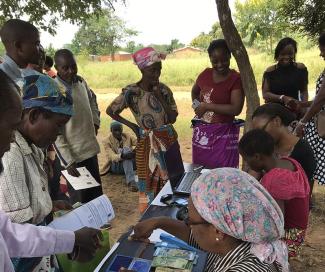KfW
Help with digital technology
 KfW Bankengruppe/Jonas Wresch
KfW Bankengruppe/Jonas Wresch
The programme targets the poorest ten per cent of needy households in Malawi. They receive cash payments not subject to conditions, so they can decide for themselves how to spend the money. The government sets the amount of the transfer payments based on the need for food, clothing, health care, school attendance and other things.
Cash payments are limited to a certain period of time. The plan is to support the selected target group for four years. Data will then be collected again.
Since many poor families in Malawi do not have a bank account, other ways had to be found to disburse the money. The families can collect their money every two months at paypoints, which are set up on a village square or in front of a school, for example. The process is coordinated via a management information system – a computerised database that stores all the data.
The beneficiaries are issued an “ID card” that proves their status as authorised claimants. The card contains a barcode, which the employees of the district authorities scan on site. This allows the recipient’s data to be accessed directly. The district officials then know how much the person is due to receive for his or her household and the sum is handed over in cash.
The process is still quite complex. The district official sets up a folding table and IT equipment supported by a mobile power unit at the paypoint, as there is almost no public electricity supply in Malawi. The administrative employee goes through the process from identification to payment with each client on site.
KfW would like to make more use of digital processes such as e-payment in Malawi in the future. However, the necessary conditions have not yet been created for this to be possible across the board. The beneficiaries – often elderly people – lack the most basic technical knowledge and have not yet used more modern payment methods. This makes it difficult to use these technologies. “The administrative workload has already been considerably reduced through improved processes,” says department director Bettina Tewinkel.
External evaluations attest to the success of the programme: “It has made an effective contribution to alleviating poverty in Malawi and the living conditions of the families have improved. They eat more regularly, more children go to school and stay in school longer overall,” explains Tewinkel.
KfW Development Bank is implementing the SCTP on behalf of the German Federal Ministry for Economic Cooperation and Development (BMZ) and the European Union (EU) in 14 of Malawi’s 28 districts, covering around 130,000 households occupied by more than 580,000 individuals.
Link
KfW, 2019: Africa – continent of opportunity.
https://www.kfw-entwicklungsbank.de/PDF/Download-Center/PDF-Dokumente-Medienkooperation-mit-E-Z/2019_10_Afrika_E.pdf




